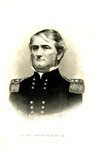About

Leonidas Polk, first Bishop of Louisiana, founded the University of the South. Born to a wealthy planter family in North Carolina, Polk first attended West Point, but turned his attention toward the episcopacy. In the immediate antebellum period the Episcopal church spread south and west, following what historian Ira Berlin calls the "Second Middle Passage," a term used to describe the migration of planters to the new territories of Alabama, Louisiana, Mississippi, and Texas as well as the forced migration of the enslaved. The bishop, for example, moved to Bayou Lafourche, La., with a wedding gift from his Raleigh-based father-in-law of 250 enslaved persons. On this plantation, Polk brought together the newest developments in technology and religion. The planter Polk used a train on his property to quickly transport sugar cane to a processing plant, and the Bishop Polk hired a priest to preach to the enslaved. Eventually, Polk succumbed to indebtedness and sold his real estate and living property to satisfy his creditors. A few short years later, Polk wrote a letter to the bishops of the southern Episcopal dioceses urging support for a great southern university to serve the purposes of a slave society. Due to Polk's fundraising and organizational efforts, the southern university garnered unparallaled support and laid its cornerstone on Oct. 10, 1860. Polk joined the Confederacy as a major general, but still served as his diocese's bishop. This arrangement drew criticism from northerners—a man of the cloth should not engage in political and military conflict—but elevated Polk in the minds of many southerners. The bishop-general sanctioned their struggle. In 1864, Polk was killed in battle.
Works
Polk Family Papers Box 10 Document
1 page: 0% complete (0% indexed, 100% transcribed, 100% needs review)
Polk Family Papers Box 10 Document 10
5 pages: 80% complete (40% indexed, 100% transcribed, 20% needs review)
Polk Family Papers Box 10 Document 12
Collaboration is restricted.
7 pages: 14% complete (0% indexed, 14% transcribed)
Polk Family Papers Box 10 Document 14
Collaboration is restricted.
4 pages: 50% complete (0% indexed, 50% transcribed)
Polk Family Papers Box 10 Document 17
Collaboration is restricted.
4 pages: 25% complete (0% indexed, 25% transcribed)
Polk Family Papers Box 10 Document 18
Collaboration is restricted.
3 pages: 33% complete (0% indexed, 33% transcribed)
Polk Family Papers Box 10 Document 19
Collaboration is restricted.
9 pages: 11% complete (0% indexed, 11% transcribed)
Polk Family Papers Box 10 Document 20
5 pages: 60% complete (0% indexed, 100% transcribed, 40% needs review)
Polk Family Papers Box 10 Document 23
Collaboration is restricted.
5 pages: 20% complete (0% indexed, 40% transcribed, 20% needs review)









